With just under fifteen minutes to play in the first half of the United States’ group-stage World Cup match against England, Weston McKennie collected the ball on the right side of the field, where he had been shading all day. He shielded the ball with his body and, with a smooth, sudden turn, swept it into the path of his stride. He flew forward, up the right flank, and then stopped and lofted the ball across the top of the box to Yunus Musah, who was drifting in above the penalty area, unmarked. Musah controlled it on the bounce and quickly directed a pass to Christian Pulisic. Pulisic took a few quick steps before hammering a shot with his left foot, past the diving goalkeeper. It ricocheted high off the crossbar and out.
That was the way the match seemed to go. McKennie, Musah, and Tyler Adams, the United States’ midfield trio, were superb on the ball and off, dominating the center of the field—diffusing England’s chances, while using their dynamic speed, creativity, and technical skills to ignite U.S. attacks. (Ten minutes before Pulisic hit the crossbar, McKennie had an opportunity to score, but his half volley sailed just over the goal.) Pulisic was dangerous throughout on the left. England had the edge on possession, but the U.S. were the ones dictating play and sending cross after cross in front of the goal. They finished with both more shots and more chances created. Yet, as in that first-half moment for Pulisic, none of the chances led to goals.
After the U.S. team had stumbled to a disappointing 1–1 draw against Wales earlier in the week, the 0–0 draw against England seemed like a win. Certainly, England fans seemed to see it that way; after the end of the match, there were boos. The question had been whether the U.S., a country that failed to qualify for the previous World Cup, could even compete with one of the pre-tournament favorites. Aside from the first and last twenty minutes of the game, anchored by a solid defense, the U.S. outplayed England.
The American squad is young—with an average age of twenty-five, the second youngest team in the tournament—and its players are just starting to find their footing in Europe’s top leagues. The focus is more on 2026, not 2022. The real pressure in this World Cup has been not to win but to impress, to play with promise and some style.
This is how America has, for much of its history, liked to think of itself—young, vital, on the cusp. England, the old colonial empire, made for a gratifying measuring stick, as if the Al Bayt Stadium, in Al Khor, Qatar, were magically transformed into Valley Forge. The reality, of course, is that we are in the twenty-first century, and the men’s national soccer team has only suddenly seemed like an appealing avatar for an ambitious nation. U.S. Soccer’s resources, which includes chefs and guaranteed pay, far exceed most federations and rival those of the sport’s superpowers. With just two teams from each group moving on, the U.S. needed the three points gained from a win in order to improve its chances to advance; a draw was effectively as good as a loss. The team will now need to beat Iran, which won against Wales on Friday, in order to make it to the knockout stage.
And, yet, the U.S. is in an enviable position. The team can play without the burden of expectations, and fans can take pleasure in a draw. There is a sense of newness. It came out in the match against England—that youthful, collaborative confidence, that almost ethical way a team can seem to operate.
The U.S. team is young, vital, on the cusp, and you could forget, watching the engaging way that they drove up the field, the sclerosis of the institutions in the country behind them. Normal people, not only authoritarian governments, use sport to distract and delude—and do it to themselves, as much as anyone else. The will to dominate becomes competitiveness. Nationalism becomes patriotism. The bang of the ball on the crossbar, for a little while at least, is the ringing of hope. ♦







More News
TikTok gets the boot; plus, a ‘tradwife’ fantasy : It’s Been a Minute
Tour guides flock to a trivia competition that demands encyclopedic knowledge of NYC
Archaeologist uncovers George Washington’s 250-year-old stash of cherries